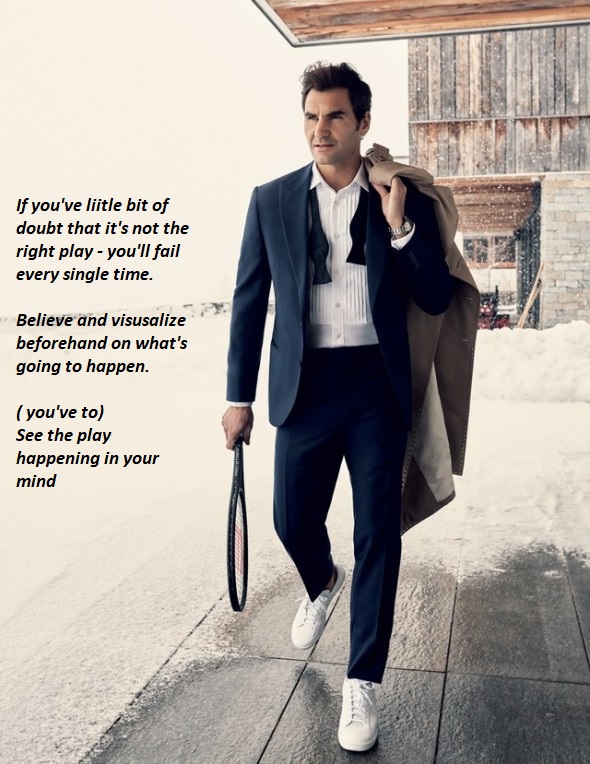A business in many ways is not too different from a sport. You can run it aggressively, passively or moderately, but to have a real impact, you have to be “in it to win it”.
“Winning it” isn’t about being the most extreme though.
You may not become the world’s largest retailer outright, if you are a store owner in small town, selling a single product that is strictly meant for locals. You can, however, be the best possible store in that category in that town, and then for towns around it. Moving progressively up the ladder, you can aim to be big in that niche. Again, you have to be self-aware if you have the skills, the drive, the passion to be excellent at what you are trying to achieve or, are willing to work to achieve it.
Notice, I am not insisting that you are excellent at what you do, rather you are, excellent at trying. Excellent results are the result of a process that is excellent.
For those who may not be Tennis fans, Roger Federer is one of the best players ever in professional tennis, routinely considered the GOAT – Greatest Of All Times. Roger is an excellent athlete, both in his approach to tennis (practice) and in his results (matches and tournaments).
Federer may be just an athlete, but there are three important lessons all of us in business can take away from him.
- The drive, the passion – if you have a drive going, if you love what you do, if you are passionate in what you pursue, you’ll end up winning.
Winning means various things to various people (a trophy for a sportsman, completing school with high GPA for a student, first sale as a startup), but the bottom line is, it is the feeling of satisfaction that you get while doing your regular work.
If you have watched Roger play, you’d have seen his remarkable passion for the game that very few other players seem to have and, that’s why despite being 39 years old in a sport where players peak in their mid-20s , he’s continuing to compete against the best players who have youth on their side and he still continues to etch out wins at the highest level.
2. The Adjustment / changing your shot –
You try, you fail, you fine-tune and you rise again.
You may have run a successful business for many years, have acquired good clients and yet, you can slip up. Sometimes the lapse is so slow that you barely notice it, and by the time you do, it is too late..
When your business seems stagnant, it’s time for your organization to change; to try a new marketing technique, a new operational strategy, a new way of doing things.
Federer was notorious for shanking balls out-of-the blue for years, and decided that success stems from change, and so he made a major one: to have a racket with bigger head (which virtually every top player was already using). Suddenly his errors went down and more backhand winners came in play.
The lesson? It’s never too late to change and if brought after a careful consideration, it’ll help you get out of a tough spot. The change, however, must be substantially different than what you’re doing.
3. Relentless pursuit – If you lose market traction, would you be able to get back to where you were and maybe eventually gain an even better position? What if you lost a big chunk of market share, lost ground to an aggressive competitor, or lost some loyal customers?! A strong leadership will re-align itself, decide on a course of action and then pursue it as if there was no tomorrow.
There was a time late in his career when the unanimous opinion in tennis circles was that Roger Federer was done as a top player: an old man on a young circuit. Yet, few months later, Federer was in the final of tennis’s most prestigious tournament, Wimbledon, meeting the current hotshot Djokovic. Federer didn’t win the final despite a hard fought battle, but the fact that he was in the championship finals and almost won it, was enough for every expert to reassess their position. Subsequently expert opinion that Roger Federer had no chance to win a major championship changed to how he was ageless . This may be surprising to some, shocking to a few, and unfortunate for his competitors, but it probably seems clear as day to Federer, given his relentless pursuit of his craft.
I hope you will combine your passion with needed changes in pursuing the dreams you have for yourself and, your organization.
What’s one concrete change you can implement immediately to put yourself on course to excellence?


